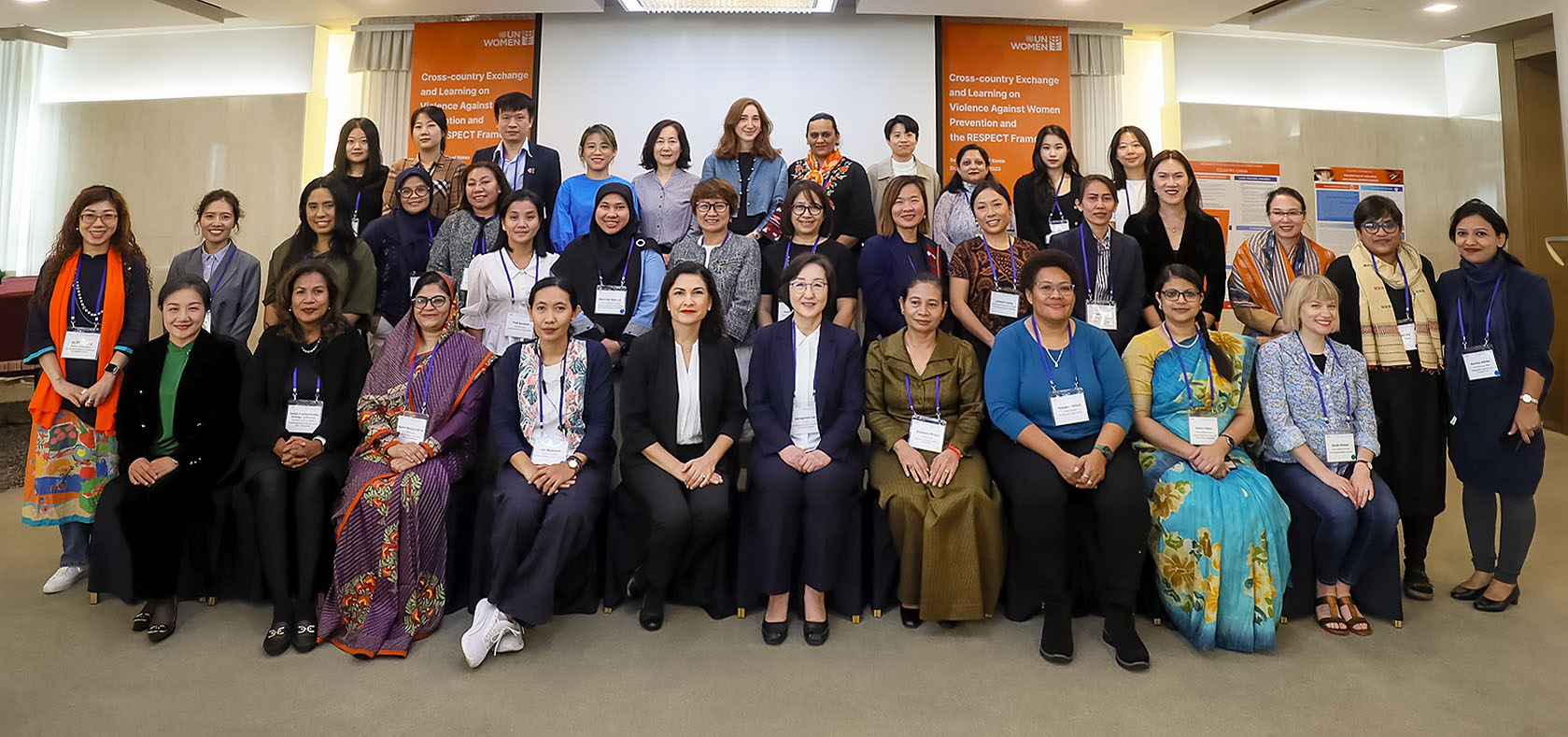[Press release]

Government representatives and experts from 10 countries in the Asia-Pacific region are taking a group photo. Photo: UN Women/Kwanju Kim
English | 한국어
Seoul, Republic of Korea — Forty-eight government representatives and experts from 10 countries across Asia and the Pacific convene at a regional workshop on preventing violence against women (VAW). Hosted from 22-26 October 2023, the workshop provided a space to discuss and strengthen evidence-based, ethical, and effective VAW prevention programming.
Violence against women is one of the most pervasive human rights violations in the world, rooted in gender inequality, discrimination and harmful cultural and social norms. To date, many responses to VAW have focused primarily on intervening with affected individuals after the violence takes place. However, prevention—addressing the structural causes, as well as the risk and protective factors, associated with violence—is pivotal to completely eliminating violence against women and girls. There has been an increasing need to address broader factors that contribute to the prevalence of violence at a global level, and to implement programmes that prevent VAW from occurring in the first place. Evidence on prevention has evolved considerably over the past decade as a result of various initiatives, including those supported by UN Women.
Melissa Alvarado, UN Women’s Regional Programme Manager on Ending Violence Against Women for Asia and the Pacific, stated: ‘’We now know more than ever before what works to prevent violence against women. The evidence about prevention has evolved considerably over the past decade. More and more evidence from UN Women is building on practical approaches that show prevention is possible and achievable in 3–5-year programme timeframes.”
To support the development of evidence-based, ethical, and effective VAW prevention programming, the workshop guided participants through programming knowledge based on existing global evidence, expert recommendations, and practitioner consensus.
During the workshop, participants explored seven strategies outlined in the RESPECT Women: Preventing Violence against Women Framework. They include promoting respectful relationships, economically empowering women, ensuring accessible services, reducing poverty, creating a safe environment, preventing child adolescent abuse, and transforming social norms. Promising practices and models for each strategy will be shared to inspire participants in their work.
The RESPECT Implementation package, developed in collaboration between the World Health Organization and UN Women in 2019, has been endorsed by 12 other UN agencies and bilateral partners. It comprises a range of practical tools and resources designed to support the implementation of the RESPECT framework. The package builds upon the evidence-based entry points outlined in its predecessor, “A framework to underpin action to prevent violence against women.”
Jeongshim Lee, Director of the UN Women Centre of Excellence for Gender Equality, noted that “preventing violence against women is a long-term strategy. It requires coordinated action and commitment across different stakeholders, such as policy makers, media, legislators, educators and employers. I hope this gathering will be a strategic first step in the region to build understanding and political will towards violence prevention.”
In addition, the workshop serves as a platform for cross-country learning among policy makers and practitioners within the Asia-Pacific region. Through the exchange of promising practices from existing VAW prevention programmes, the workshop contributes to the regional perspective on VAW Prevention and the RESPECT Implementation package. It includes policymakers and practitioners from Australia, Bangladesh, Cambodia, China, Fiji, Indonesia, India, the Republic of Korea, Viet Nam and Timor-Leste.
UN Women’s programme guidance for developing and implementing VAW prevention programmes was introduced to the participants to support them identify the most effective intervention types adaptable to their specific contexts. Since many participants are policy makers working on ending violence against women, an important part of the agenda was the review of countries’ experiences in the development, implementation, and monitoring of the National Action Plans on Prevention of VAW within the region, such as Australia, Cambodia, Fiji, and Timor-Leste. The participants will then recommend follow-up actions to strengthen policies and programmes for VAW prevention at the country level.
UN Women has played a pivotal role in developing evidence-based policy and programming guidance on prevention of VAWG. Since the establishment of the UN Women Centre of Excellence on Gender Equality based in Seoul, the center has prioritized efforts to end VAW.
This workshop will mark the third event of the year for the Centre focusing on VAW following the earlier workshop on “Empowering Youth To Address Technology- Facilitated Gender-Based Violence” and an international conference on “Ending Gender Related Killings of Women and Girls in the Asia-Pacific region.”
